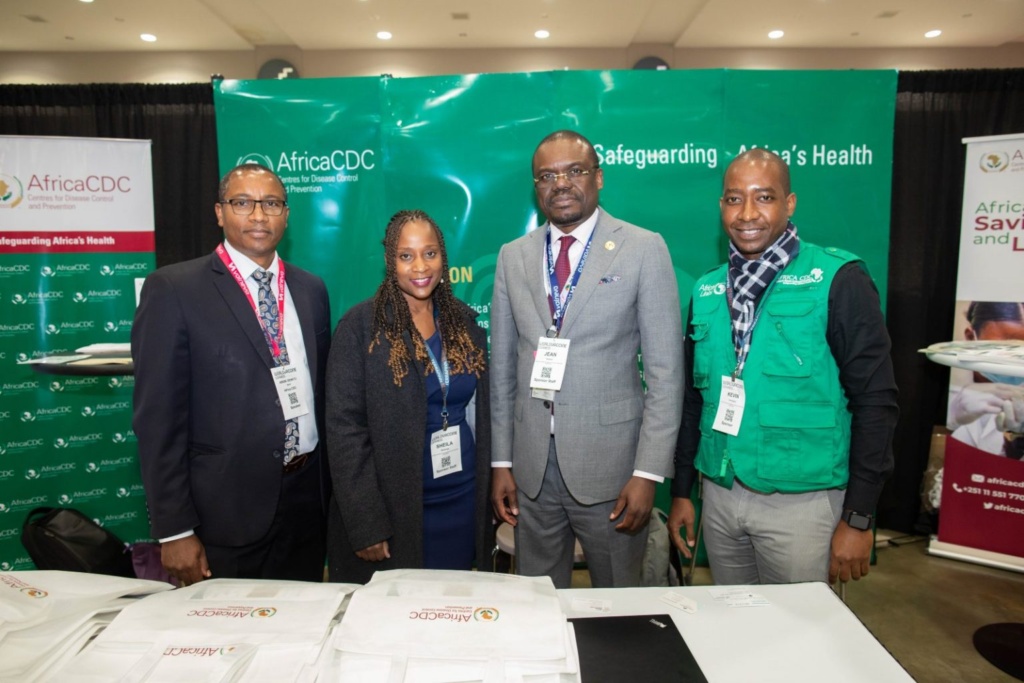
The Africa Centres for Disease Control and Prevention (Africa CDC) participated in the World Vaccine Congress in the USA, demonstrating its leadership role in Africa’s vaccine manufacturing ecosystem.
Africa CDC’s engagement included a strategic roundtable, four (4) insightful speaking sessions, and a lively exhibition booth. This robust participation stimulated critical discussions around vaccine manufacturing, equity, localisation, enhancement of supply chains and procurement processes.
The Roundtable hosted by Africa CDC, in partnership with Mastercard Foundation under the Saving Lives and Livelihoods initiative, addressed the urgent need to develop a sustainable vaccine Research and Development (R&D) workforce in Africa.
The panel of experts from leading organisations stressed the need for innovative financing and greater coordination to overcome the continent’s R&D and manufacturing talent deficits. One key takeaway was the call to cultivate partnerships, boost workforce development, and champion the complete localisation of the R&D value chain.
Enhancing capacity through intra-continental collaboration is important, and political support is critical to bridge the significant gaps in R&D and manufacturing. Efforts are underway to establish a network of regional capacity and capability centres, enabling African research institutions to collaborate and share resources.
During the keynote panel on ‘Implementing Vaccine Manufacturing in Africa.’
Dr. Abebe Genetu Bayih, the Acting Coordinator of the Partnership for African Vaccine Manufacturing (PAVM), emphasised the need for synergy among African member states. He outlined Africa CDC’s pivotal role in streamlining efforts and fostering demand for locally produced health products, underlining the need for R&D, workforce development, technology transfer and ensuring vaccine manufacturers in Africa have a sustainable market and economies of scale through the pooled procurement mechanism. The session on Global Health and Monoclonal Antibodies shed light on the essential function of monoclonal antibodies in tackling diseases in lower-middle-income countries, focusing on the hurdles of cost and regulatory barriers to access.
Dr. Yewande Alimi, the One Health Unit Lead at Africa CDC, highlighted the importance of vaccines as a cost-effective intervention to reduce infections and the subsequent need for antimicrobial consumption, which drives AMR. She underscored the need to scale up local manufacturing for relevant vaccines and increase policy investments in Africa’s manufacturing ecosystem during the panel session on “Defining the Value of Vaccines Against AMR.” She called for simplified AMR messaging to the public and policy makers to promote the value of vaccines as a cost-effective intervention for low and middle income countries.
Furthermore, discussions on building healthcare supply chains for regional production in Africa addressed overcoming trade barriers and fostering public-private partnerships to enhance local manufacturing coordination and capabilities.
The Africa CDC exhibition booth showcased Africa CDC’s work in the vaccine ecosystem, including efforts through the Platform for Harmonized African Health Products Manufacturing (PHAHM), the Saving Lives and Livelihoods initiative, Antimicrobial Resistance, and One Health and other health programs. The event attracted 4,000 attendees, including 450 speakers and 250 exhibitors, all committed to advancing the global vaccine value chain.
Health Security for Africa means access to safe and effective vaccines, and the Africa CDC is committed to expanding local manufacturing of vaccines, diagnostics, and therapeutics, a key strategy that is essential for achieving Africa’s self-sufficiency and significantly enhancing global health security.










